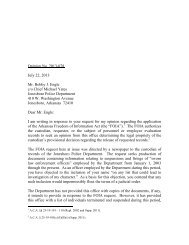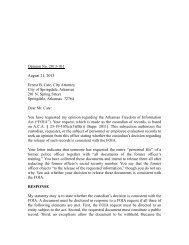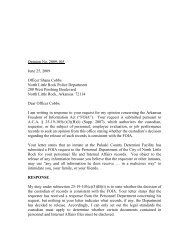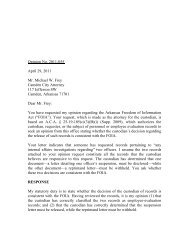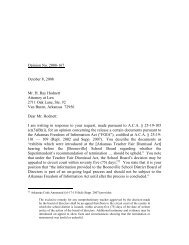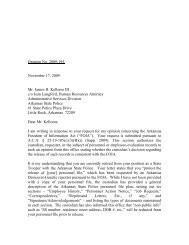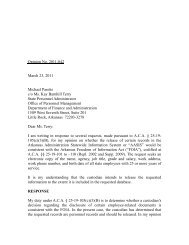Opinion No. 2012-069 May 7, 2012 Mr. Paul Turney c/o Assistant ...
Opinion No. 2012-069 May 7, 2012 Mr. Paul Turney c/o Assistant ...
Opinion No. 2012-069 May 7, 2012 Mr. Paul Turney c/o Assistant ...
Create successful ePaper yourself
Turn your PDF publications into a flip-book with our unique Google optimized e-Paper software.
<strong>Paul</strong> <strong>Turney</strong>c/o Jonesboro Police Department<strong>Opinion</strong> <strong>No</strong>. <strong>2012</strong>-<strong>069</strong>Page 2discussion must be limited to the applicable tests for the disclosure of employeerelatedrecords. 1The FOIA provides for the disclosure upon request of certain “public records,”which the Arkansas Code defines as follows:“Public records” means writings, recorded sounds, films, tapes,electronic or computer-based information, or data compilations inany medium required by law to be kept or otherwise kept and thatconstitute a record of the performance or lack of performance ofofficial functions that are or should be carried out by a publicofficial or employee, a governmental agency, or any other agencyor improvement district that is wholly or partially supported bypublic funds or expending public funds. All records maintainedin public offices or by public employees within the scope of theiremployment shall be presumed to be public records. 2Because the subject of the request is an internal affairs investigation of a formercity employee, it seems clear that the requested documents are in all probability“public records” under the definition set forth above. Consideration must begiven, however, to the possible applicability of an exemption from disclosure.The FOIA provides for certain exemptions, the most pertinent of whichpresumably is the exemption from disclosure under specified circumstances forpersonnel and employee evaluations or job performance records. 3“Personnel records” are open to public inspection and copying under the FOIA,except “to the extent that disclosure would constitute a clearly unwarrantedinvasion of personal privacy.” 4 The FOIA does not define the term “personnel1 Records maintained with regard to the employment of a public employee typically comprise both“employee evaluation/job performance records” and “personnel records” within the meaning of the FOIA.It is important for the custodian of the records to classify the records correctly because, as discussed furtherherein, the standards for releasing these two types of records differ.2 A.C.A. § 25-19-103(5)(A) (Supp. 2011).3 A.C.A. § 25-19-105(b) (12) and (c)(1) (Supp. 2011).4 Id. at (b)(12).
<strong>Paul</strong> <strong>Turney</strong>c/o Jonesboro Police Department<strong>Opinion</strong> <strong>No</strong>. <strong>2012</strong>-<strong>069</strong>Page 3records.” Whether a particular record constitutes a personnel record within themeaning of the FOIA is, of course, a question of fact that can only be definitivelydetermined by reviewing the record itself. However, this office has consistentlyopined that personnel records are all records other than employee-evaluationrecords that pertain to, among others, individual employees and former employees.<strong>No</strong>r does the FOIA does not define the phrase “clearly unwarranted invasion ofpersonal privacy.” But the Arkansas Supreme Court has construed the phrase andadopted a balancing test to determine if it applies. That test requires that oneweigh the public’s interest in accessing the records against the individual’s interestin keeping the records private. 5 If the public’s interest outweighs the individual’sinterest, the custodian must disclose the personnel records. As the court noted inYoung:The fact that section 25-19-105(b)(10) [now subsection 105(b)(12)]exempts disclosure of personnel records only when a clearlyunwarranted personal privacy invasion would result, indicates thatcertain “warranted” privacy invasions will be tolerated. Thus,section 25-19-105(b)(10) requires that the public’s right toknowledge of the records be weighed against an individual’s right toprivacy….Because section 25-19-105(b)(10) allows warrantedinvasions of privacy, it follows that when the public’s interest issubstantial, it will usually outweigh any individual privacy interestsand disclosure will be favored. [6]In contrast, as the court noted in Stilley v. McBride, when there is “little relevantpublic interest” in disclosure, “it is sufficient under the circumstances to observethat the employees’ privacy interest in nondisclosure is not insubstantial.” 7 Giventhat exemptions from disclosure must be narrowly construed, it is the burden of anindividual resisting disclosure to establish that his privacy interests outweighed5 Young v. Rice, 308 Ark. 593, 826 S.W.2d 252 (1992).6 Id. at 598.7 332 Ark. 306, 312, 965 S.W.2d 125 (1998).
<strong>Paul</strong> <strong>Turney</strong>c/o Jonesboro Police Department<strong>Opinion</strong> <strong>No</strong>. <strong>2012</strong>-<strong>069</strong>Page 4that of the public’s under the circumstances presented. 8 Further, the requestor’smotive in seeking the documents is usually irrelevant to whether the documentshould be disclosed. 9“Employee evaluation or job performance records,” on the other hand, arereleasable only if certain conditions have been met. Specifically, the Codeprovides in pertinent part:[A]ll employee evaluation or job performance records, includingpreliminary notes and other materials, shall be open to publicinspection only upon final administrative resolution of anysuspension or termination proceeding at which the records form abasis for the decision to suspend or terminate the employee and ifthere is a compelling public interest in their disclosure. 10Similar to personnel records, the FOIA does not define the term “employeeevaluation or job performance records.” But the Arkansas Supreme Court hasrecently adopted this office’s view that the term refers to any records created by orat the behest of the employer that detail the performance or lack of performance ofthe employee in question with regard to a specific incident or incidents areproperly classified as employee evaluation or job performance records. 11 Therecord must also have been created for the purpose of evaluating an employee. 12The exemption promotes candor in a supervisor’s evaluation of an employee’sperformance with a view toward correcting any deficiencies. 138 Id. at 313.9 See, e.g., Op. Att’y Gen. 2010-148.10 A.C.A. § 25-19-105(c)(1).11 Thomas v. Hall, <strong>2012</strong> Ark. 66, ___ S.W.3d ___ (Feb. 16, <strong>2012</strong>); see, e.g., Ops. Att’y Gen. <strong>No</strong>s. 2009-067; 2008-004; 2007-225; 2006-111; 2006-038; 2006-035; 2005-030; 2004-211; 2003-073; 98-006; 97-222; 95-351; 94-306; and 93-055.12 See, e.g., Op. Att’y Gen. <strong>No</strong>. 2008-004; 2006-038; and 2004-012.13 See J. Watkins & R. Peltz, The Arkansas Freedom of Information Act (5th ed., Arkansas Law Press2009), at 204.
<strong>Paul</strong> <strong>Turney</strong>c/o Jonesboro Police Department<strong>Opinion</strong> <strong>No</strong>. <strong>2012</strong>-<strong>069</strong>Page 6should be sufficient to satisfy the compelling public interestrequirement. 15Professors Watkins and Peltz also note that the status of the employee or his rankwithin the bureaucratic hierarchy may be relevant in determining whether acompelling public interest exists. 16 Whether there is a compelling public interestin particular records is a question of fact that must be determined in the firstinstance by the custodian of the records, considering all of the relevantinformation. This office has repeatedly opined that, in certain situations, acompelling public interest exists in the disclosure of documents containing certaincategories of information. 17 However, neither I nor any of my predecessors haveopined that only these categories of information could give rise to a compellingpublic interest favoring disclosure. In my opinion, regardless of what category ofinformation a document contains, in order to determine whether a compellingpublic interest exists in its disclosure, the custodian must conduct a detailedreview of the document considering the factors discussed above. The existence ofa “compelling public interest” in disclosure will necessarily depend upon all of thesurrounding facts and circumstances in each case.It must also be noted that while you report that you have been terminated, you donot indicate whether you have exhausted any administrative appeals that might beavailable. As noted above, an employee evaluation/job performance record cannotbe released so long as an administrative appeal is still available. Assuming nopossibility of appeal remains, the pertinent issue will be whether a compellingpublic interest in disclosure of the requested records exists. As indicated, this isultimately a factual determination that must be made by the records custodian.15 Id. at 217-18 (footnotes omitted).16 Id. at 216 (noting that “[a]s a practical matter, such an interest is more likely to be present when a highlevelemployee is involved than when the [records] of ‘rank-and-file’ workers are at issue.”)17 E.g., Op. Att’y Gen. 2009-195, citing Ops. 2007-206 (information reflecting a violation of departmentalrules by a “cop on the beat” in his interactions with the public); 2001-144 (use/possession of drugs); 2003-257, 97-190 and 97-177 (arrests and/or convictions); 2003-072, 2001-343, 98-210, 98-075, 97-400 and 92-319 (violation of administrative rules and policies aimed at conduct which could undermine the public trustand/or compromise public safety).
<strong>Paul</strong> <strong>Turney</strong>c/o Jonesboro Police Department<strong>Opinion</strong> <strong>No</strong>. <strong>2012</strong>-<strong>069</strong>Page 7In sum, although I cannot offer a definitive opinion regarding the release of anyparticular records, the foregoing discussion should be of assistance in evaluatingthose at issue.Deputy Attorney General Elisabeth A. Walker prepared the foregoing opinion,which I hereby approve.Sincerely,DUSTIN McDANIELAttorney GeneralDM:EAW/cyh



